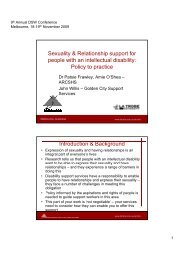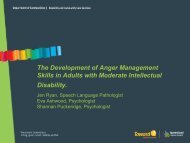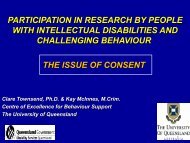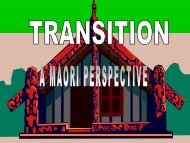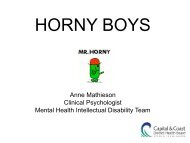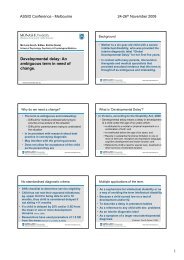Legislating for Care - Australasian Society for Intellectual Disability
Legislating for Care - Australasian Society for Intellectual Disability
Legislating for Care - Australasian Society for Intellectual Disability
- No tags were found...
Create successful ePaper yourself
Turn your PDF publications into a flip-book with our unique Google optimized e-Paper software.
Aim of StudyTo explore how the care manager role underthe <strong>Intellectual</strong> <strong>Disability</strong> (Compulsory <strong>Care</strong>and Rehabilitation) Act 2003 is working inpractice.- How has the theory of compulsory carebeen translated into practice?
Need <strong>for</strong> researchSix years since implementation of IDCCRActThe Act has not been evaluated - Bondari(2009) recommends need <strong>for</strong> externalevaluation<strong>Care</strong> manager role is new, complex andcarries considerable responsibility
Background to IDCCR Act 2003In 1992, Mental Health (CAT) Act passedCreated a legal definition of ‘mental disorder’Section 4(e) specifically excludes people withintellectual disability (ID)Offenders with intellectual disability were nolonger covered by legislation
People with ID ‘fell between the cracks’(although some providers created innovativesolutions)There<strong>for</strong>e ...Options <strong>for</strong> support <strong>for</strong> offenders withintellectual disability were limitedCourts no longer had an option <strong>for</strong>compulsory care if an offender only had anintellectual disability
IDCCR Act 2003Developed to allow <strong>for</strong> compulsory care andrehab of offenders with intellectual disabilityWorks closely with Criminal Procedure (MIP)Act 2003Together, the acts allow the courts to ordercompulsory care <strong>for</strong> individuals with anintellectual disability “who have beencharged with, or convicted of, an
Includes:The IDCCR Act covers ...An individual with intellectual disability:Awaiting trial or sentencingTransferred from:prisonmental health servicesSubject to a court order under the CP(MIP) Act
The IDCCR Act created ...New services:RIDSAS (supported accommodation)RIDSS (secure accommodation)Statutory roles:Specialist assessorCompulsory care co-ordinatorDistrict inspectorMedical consultant
Current situation$75.5 million allocated <strong>for</strong> 2008/2009As of September 2008, there are 135 peopleunder IDCCR orders50 in secure settings85 in supervised settingsApprox 31% charged with sexual offence(Bonardi, 2009)
This study will explore ...Characteristics of CMs (qualifications,training, ethnicity etc).How role works in each type of settingPreparation & support <strong>for</strong> roleIssues related to statutory requirementsCMs perspectives on how they contributeto wellbeing of care recipients
Methodology & MethodsQualitative descriptiveData collectionIndividual interviews and regional focusgroups with care managers from across NewZealandFocus groups with others (e.g. specialistassessors, care co-ordinators, culturaladvisors) who work with care managersData analysisContent analysis: categorical & thematic
When will study happen?Funding secured - March 2009Ethics approved - July 2009Sector Reference group & culturaladvisors appointed - July 2009Interviews - commence October 2009Focus groups – early 2010
Our TeamKate Prebble (Lead Researcher) - University of AucklandKate Diesfeld - AUTMichelle Honey - University of AucklandBrian McKenna - University of AucklandDaniel Sutton – AUT<strong>Disability</strong> Consultant: Russell Vickery
How can you help?Let people know about the studyEncourage care managers to be involvedContinue discussion of the IDCCR Act andits effect on people with intellectualdisability
O’Brien, P., Miller-Burgering, W., Diesfeld, K., Vickery, R., & Lett, L. (2002). Interface betweenpeople with intellectual disability and the criminal justice system, Auckland: Auckland College ofEducation.ReferencesBonardi, A. (2009). The balance between choice and control: Risk management in New Zealandintellectual disability services. Wellington: Fullbright.Brookbanks, W. (1995). The development of legislation to meet the needs of individuals withintellectual disability who, because of their disability, are considered to present a serious risk toothers: a discussion paper, Wellington: Ministry of Health.Diesfeld, K., McLean, M., Phelan, T., Patston, P., Miller-Burgering, W., & Vickery, R. (2008). Thechallenge of designing optimum legal services <strong>for</strong> disabled people: The New Zealand experience,<strong>Disability</strong> and <strong>Society</strong> 23(5), 431-443.Ministry of Health (2004), A guide to the <strong>Intellectual</strong> <strong>Disability</strong> (Compulsory <strong>Care</strong> andRehabilitation) Act 2003, Wellington: Ministry of Health.Ministry of Health (2004), Guidelines <strong>for</strong> the role and function of care managers under the<strong>Intellectual</strong> <strong>Disability</strong> (Compulsory <strong>Care</strong> and Rehabilitation) Act 2003, Wellington: Ministry ofHealth.



